In 1991, Who Framed Roger Rabbit came to PC in an unexpected format
We're rerunning Richard Cobbett's classic Crapshoot column, in which he rolled the dice and took a chance on obscure games—both good and bad.
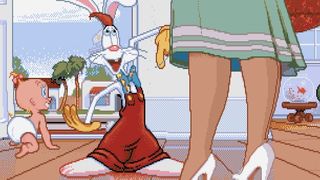
From 2010 to 2014 Richard Cobbett wrote Crapshoot, a column about rolling the dice to bring random games back into the light. This week… who framed Roger Rabbit? Judge Doom. But that's not important right now—this Easter bunny has other reasons to get hot and cross.
No argument is permitted here: Who Framed Roger Rabbit was a great movie. The noir ambience. Bugs Bunny and Mickey Mouse sharing a screen. The perfect line "Dabbling in watercolours, Eddie?" The subtle details children were never expected to get. Really, it only has one problem—Roger Rabbit himself being the cartoon equivalent of getting a filling in every single tooth and then chomping on tinfoil.
Didn't stop him getting his own game, mind. Oddly though, it wasn't a platformer.
That's what you'd expect for the early '90s—a generic load of streets where Roger or Eddie runs around and has wacky adventures with assorted cartoon types, probably with an LJN logo on it for console owners. And yes, those games existed and were dreadful. On PC and Amiga though, the licensees tried something a little different—instead of converting the movie itself, playing with Roger's job as a cartoon star. Hare Raising Havoc then is an expansion of the short at the start, where long-suffering Roger has to save the 'innocent' Baby Herman from wandering off into harm. Points for trying at least.
What stands out about this one is how good it looks. It's about 6MB in total, which stuffs in lots of cartoon action, recorded voice samples, and some pretty fancy wrappings for both the cartoon intro, and the studio the action cuts to every time something goes wrong. It's obviously not Disney-quality animation, but it's several cuts above what most other games were doing at the time. The only real catch? The result is that the game is phenomenally short. It's about 15 minutes if you know what you're doing, compensated for by a brutally tight, perfection-demanding time limit if you don't.
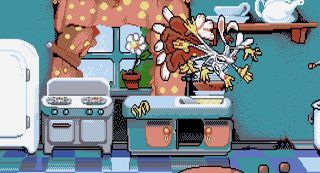
It's also pretty horrible, with limited interaction and tedious slapstick you have to keep replaying to beat the incredibly finnicky timing challenges. There's also something more than a little creepy about it, which I found hard to put my finger on at first. Let me explain the premise—when you see it, shout. Since I'm probably not in the room, and also not writing this as you read it, you'll need to shout quite loudly, ideally through a dimensional tear in time and space.
You're Roger, and as the game starts you're being ordered to babysit Baby Herman, right as Baby Herman disappears out of the front door. Frankly, given that his mother is standing right there at the time, this one really has to be on her. It's only Roger's fault if anything happens while he's in charge, surely. Still, the objective is pretty simple: get Baby Herman—
PC Gamer Newsletter
Sign up to get the best content of the week, and great gaming deals, as picked by the editors.
OK, that was weird. A strange voice just yelled "BATHOS!" out of nowhere. Well, top marks for interdimensional manipulation, but that's not the right answer. So, where was I before I was so rudely distracted? Ah, yes. The objective is pretty simple: get Baby Herman back. The only problem is that you're locked in the house for some reason and have to escape and track him down first.
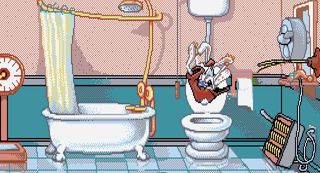
Controls are dirt simple—up, down, left, right, and action—with the general idea being to abuse Roger's toon ability to take punishment to solve problems. In the first room the trick is to open an ironing board, then push a stool so that he can jump on the sofa to be caught on a ceiling fan to be thrown at the ironing board to bounce off the stool to go through the window on the door. It's a kind of puzzle design Coktel would use in its Gobliiins series in the same year.
The issue here is with the concept of crime and punishment—that a character's suffering usually has to be earned in some way by their actions. It might be a literal crime, where a villain faces humiliating retribution, or something simple, like the prideful businessman being hit by a pie. The basic rule is that the more serious the crime, the worse the punishment can be and still be funny rather than coming across as bullying from other characters or the universe. Like everything, there are exceptions, including good old schadenfreude and refuge in audacity, but the rule works as a starting point and ignoring it often results in the line between comedy and tragedy reaching an all-cress-diet level of thin.
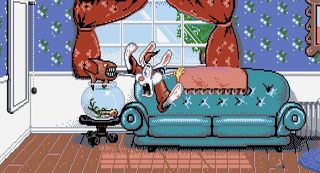
In the case of a cartoon (and gosh, isn't discussing comedy hilarious?) that 'crime' can be various things. Tom suffers for chasing Jerry. In Hare Raising Havoc though, much of what goes wrong is deliberately initiated by the player. A character falling on a banana peel might be funny. A stranger throwing that banana peel down to make them slip though is simply being a dick, to say nothing of making a good-natured innocent walk onto a burning stove just to make them leap up in agony and help solve a puzzle. In Hare Raising Havoc, you are that dick—setting up situations where Roger gets beaten up without having done anything to deserve it.
Unless of course you count 'being Roger Rabbit', which on second thoughts is probably a crime worthy of being very slowly lowered balls-first into a bucket of Dip, so never mind, I guess.
Still, in principle, this approach feels a little Wrong. Just a little. Y'know?
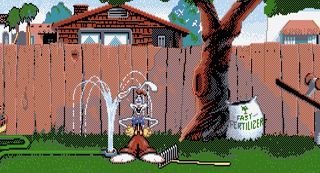
The big problem for anyone trying to make a game around Roger Rabbit is that so few of the characters were available post-movie. Disney and Warner Bros weren't about to let a mere licensee throw in their characters as extras, and there's not a vast amount to be done with just Eddie, Jessica, Roger, and a couple of others. That's a real pity though, as an LA Noire-type adventure with Toons could be fantastic. Almost as good as an LA Noire that actually understood the genre, instead of being, well, LA Noire.
The nature of this game means there's not a vast amount more to say about it. It's a series of set-pieces I could describe, but are probably better simply watched. As ever, YouTube provides with this complete walkthrough. The length and the general lack of stuff to poke at are the main reasons this game struggled at the time. On CD though, with more actual content a la Virtual Springfield, it could have been a neat Multimedia Experience™.
With, ideally, less Roger Rabbit. None would have been a good start.
And just for the sake of comparison, here's what Nintendo fans got. Sure, it would have lasted them longer. But it would also have been... this. Shudder. The music alone. As over-played as Why Don't You Do Right? is these days, at least it takes more than one play to never want to hear it again.
The NES game? Half a level, maximum.
Luckily, the PC did finally get a spiritual answer to all this in the form of Toonstruck, in which a very bored Christopher "A Role That Christopher Lloyd Played" Lloyd played the role of 'human' in three worlds of original cartoon creations. It pulled it off pretty well, was spectacularly rude (going from a happy cutesy world to a sheep and a cow taking up bondage), and a cool adventure in its own right. We'll probably take a look at it one week. But a different week.
Now I really must do something about all these dimensional tears...
Most Popular

